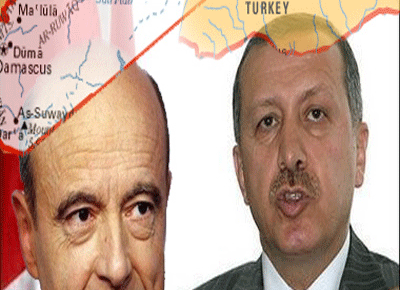
The French satirical weekly Canard Enchaîné unveiled all the NATO secret service operations going on for several months, aimed at setting up a back base in Turkey for a military operation against Syria.
"Aid to the civilian and military rebellion, resolution to the UN Security Council to avoid a Russian or Chinese veto, weapons trafficking on the Syrian border, necessary contacts to Washington via NATO, these are all the subjects being discussed currently among Paris, London and Ankara," says editor Claude Angeli, who cites a French Foreign Ministry spokesman admitting that "Turkey could be the back base for a limited, cautious, and humanitarian intervention of NATO, without an offensive action."
For the past few weeks, says Angeli, the French, British and Turks have all been spouting the same line that President Bashar al-Assad refuses to step down. Recently in Ankara, French Foreign Minister "Alain Juppé was able to confirm that the Turkish government was very worried about a civil war beginning on its border, and that he wanted his dictator neighbor to step down."
The Turks are proposing to establish a "no-fly zone" and an exclusion zone within Syria, aimed at assembling civilians fleeing repression and the defecting military (according to French secret services there could be 8,000 high-level officers). "Not so easy to set up because Turkish bases would have to host French and British airplanes."
"But even before the elaboration of those strategic projects," some report at France’s Defense Ministry, "the secret services were already operational. In northern Lebanon and in Turkey, where many Syrian defectors are taking refuge, French DSGE [secret service] officers and British MI6 are on mission to constitute the first contingents of the Free Syrian Army, still in embryo. For instance, several members of the action service of the DGSE and the Special Operations Command are already in Turkey, ready to train the defectors in urban guerrilla [warfare]if they receive orders to.... Another discreet operation: weapons trafficking at the Syrian border is tolerated, even encouraged by France and Turkey."
A repeat of the Libyan scenario? Officially no, but "it was the French and the British who were the first to make contact with the rebels. Political contacts were established also with political refugees in Paris and London, and with the military defectors, to evaluate the relative importance of their Free Syrian Army which has already attacked several official buildings."
One source of worry in Ankara however, is the "fact that the partisans of Bashar could incite the Kurds to restart their anti-Turkish terrorism." More important, "and not without reason, is Moscow’s support for the Syrian dictator. Several hundred Russian collaborators are operating at Tartous, the port where the Russian submarines can come freely when they make a tour in the Mediterranean."
What follows is the threat of an imminent land war: "Even if Moscow’s support is a guarantee against the Security Council resolutions, the future of Bashar will be determined on the ground. Three armored divisions, an infantry division and the Republican Guard, i.e., 30,000 loyalists, members of the Alawite community, serve him as bodyguards. They, also, know what they are risking in this war among Muslims."
Tragedy of history, says Angeli, although he neglects the global dimension of the problem, "an eventual ’limited’ intervention of those three member-countries of NATO could, if Bashar does not leave power, unleash a long civil and religious war between his Alawite community (a minority branch of Shi’ism), and his Sunni opponents."
[Photo: French Foreign Minister Alain Juppé, left, with Prime Minister of Turkey Recep Tayyip Erdoğan.]












Stay In Touch
Follow us on social networks
Subscribe to weekly newsletter